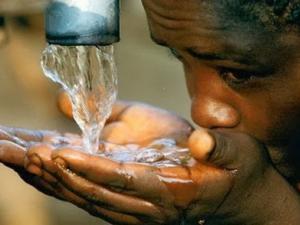 Israeli Ambassador Sharon Bar-li, together with Deputy Head of Mission of the Embassy of Netherlands Caecilia Wijgers, joined President John Dramani Mahama and the Minister for Water Works and Housing, Collins Dauda, to inspect the completed Accra Tema Metropolitan Area (ATMA) Rural Rehabilitation Project.
Israeli Ambassador Sharon Bar-li, together with Deputy Head of Mission of the Embassy of Netherlands Caecilia Wijgers, joined President John Dramani Mahama and the Minister for Water Works and Housing, Collins Dauda, to inspect the completed Accra Tema Metropolitan Area (ATMA) Rural Rehabilitation Project.
The ATMA Rural Rehabilitation project was jointly funded by the Israel and Netherlands with US$19million and €41 million respectively, and has been designed and built by Israeli engineering, design and construction firm TAHAL Group.
The project is expected to produce a daily supply of 46,000m³, equivalent to 9 million gallons of potable water to serve an estimated population of 250,000 inhabitants.
The ATMA Rural Rehabilitation Project has been equipped with additional facilities to enable it produce 56,000m³ daily supply of water in the future should the government decide to do so.
The Ambassador of Israel Sharon Bar-li said: “Coming from Israel, a country that has scarce water resources, we know that water equals life.
Therefore, we are proud to take part in a project that connects so many Ghanaians to potable water and elevates their standard of living”.
The Ambassador further commented that TAHAL, the executing company, is one of the oldest Israeli companies working in Ghana — since Ghana gained its independence — and that it constitutes an example of what Israeli companies have to offer Ghana.
On his part, the General Manager of TAHALGhana Ehud Avny expressed satisfaction with the work done. He is delighted to have completed the work on schedule as the Tahal Group marks fifty years of work and cooperation in Ghana
. According to him, the TAHAL Group will continue to offer sustainable integrated solutions in the water and agricultural sectors in Ghana, which will help transform challenging situations to benefit both urban and rural populations in the country.
The Israeli and Netherlands-funded ATMA Rural Rehabilitation Project has improved water supply to Michel Camp, Afienya, Kpone, Prampram, Old Ningo, New Ningo, Ayitepa, Kponguno, Omankope, Kodiabe, Doyumu, Agomeda, Adumanya, Menyum, Dodowa, Odese, Nganompian, Bawalashie, Oyibi, Amanfro, Latehman, Ashiyie, Fafraha, Abominya, Ayikuma, Abokobi, Pantang and Ayi Mensah areas, all in the Greater Accra Region.
The rest are Akorley, Abonse, Aperade, Adukrom, Awukugua, Dawu, Abiriw, Akropong, Mamfe, Amanokrom, Tutu, Obosomase, Ahwerase, Aburi, Gyankama, Kitase, Peduase, Berekuso, Akwamufie, Mangoasi, Atimpoku, New Senchi, Akrade, Senchi, Domeabra, Lolonyo, Agomanya, Manya Kponwono, Odumasi, Menekpo, Sra, Sawe and Ogome, all in the Eastern Region of Ghana.
Source: B&FT























